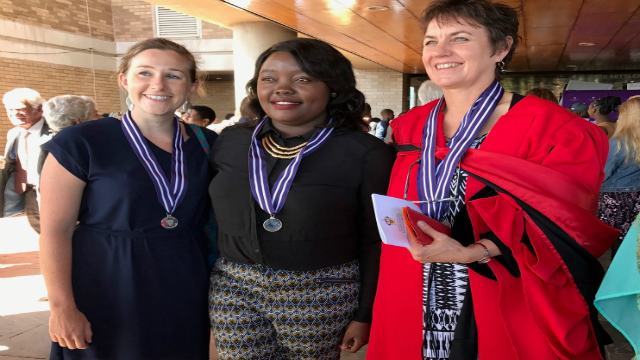
Community Engagement Award for the Amanzi for Food Project
The Environmental Learning Research Centre, together with the Water Research Commission, have been actively engaged in developing an innovative social learning model focussing on water for food production via the Amanzi [Water] for Food project.
At this year’s graduation, the project was awarded the Vice Chancellor’s Distinguished Community Engagement Award (one of two recipients). In March it was also selected for presentation at the Partnership for Green Economy (PAGE) inter-ministerial conference in Berlin, Germany.
The project responds to a critical issue facing many households in South Africa, where household food security is a challenge. Around 8 million households are food insecure, with hunger and chronic malnutrition widespread.
The government’s National Development Plan seeks to increase the number of households benefiting from food and nutrition security initiatives by 200,000, and to establish and support 80,000 smallholder producers.
The Amanzi for Food project is a social learning innovation, that seeks to support inclusive, sustainable development, water and food security. It aims to “work much more creatively with rainwater harvesting knowledge, technologies and practices at smallholder farmer and household food production levels by infusing these into an engaged model of college curriculum development and training intervention”.
A key group to involve are women farmers, who are most frequently responsible for farming decisions at small holder farmer and household food production level. Agricultural associations, extension officers and local development officers are also involved as they are important knowledge mediators.
Working with Fort Cox agricultural college and the University of Fort Hare, a learning network partnership was established with these local organisations and farmers. The group established a learning network called the Imvothu Bubomi network meaning ‘Water is Life’. From here they participated in a training of trainers’ programmes that help to translate research-based knowledge into practice.
In the Agricultural Colleges, lecturers were supported to develop curriculum innovation projects which included shared demonstration site development. Extension officers, Local Economic Development officers, researchers, farmers and farmers’ association members were included in the training of trainers’ sessions. All participated in the productive demonstrate site development. Their experiences were shared on local radio, and via social media channels to further expand the learning in the context.
Initial project analysis showed that colleges continue to focus on larger scale farming and mainstream irrigation technologies, despite the fact that water is increasingly scarce, and that the agricultural sector is the largest water user in South Africa. There is little “new” water for developing the smallholder farmer sector. This initiative helped to build knowledge exchange to address this concern across university, community, and municipalities via an engaged social learning approach.
The Amanzi for Food project was developed as a social learning innovation partnership between the Water Research Commission and Rhodes University’s Environmental Learning Research Centre and local partners. The project has been running for three years with support from the Water Research Commission. A second phase of the project is now in development.
Overall the project has activated the use of available, and much needed knowledge for rainwater harvesting and conservation practices amongst smallholder farmers and household food producers, in a productive partnership with the Water Research Commission, local communities and municipality, education institutions and farmers and their associations.
Visit www.amanziforfood.co.za for further information on the project.
